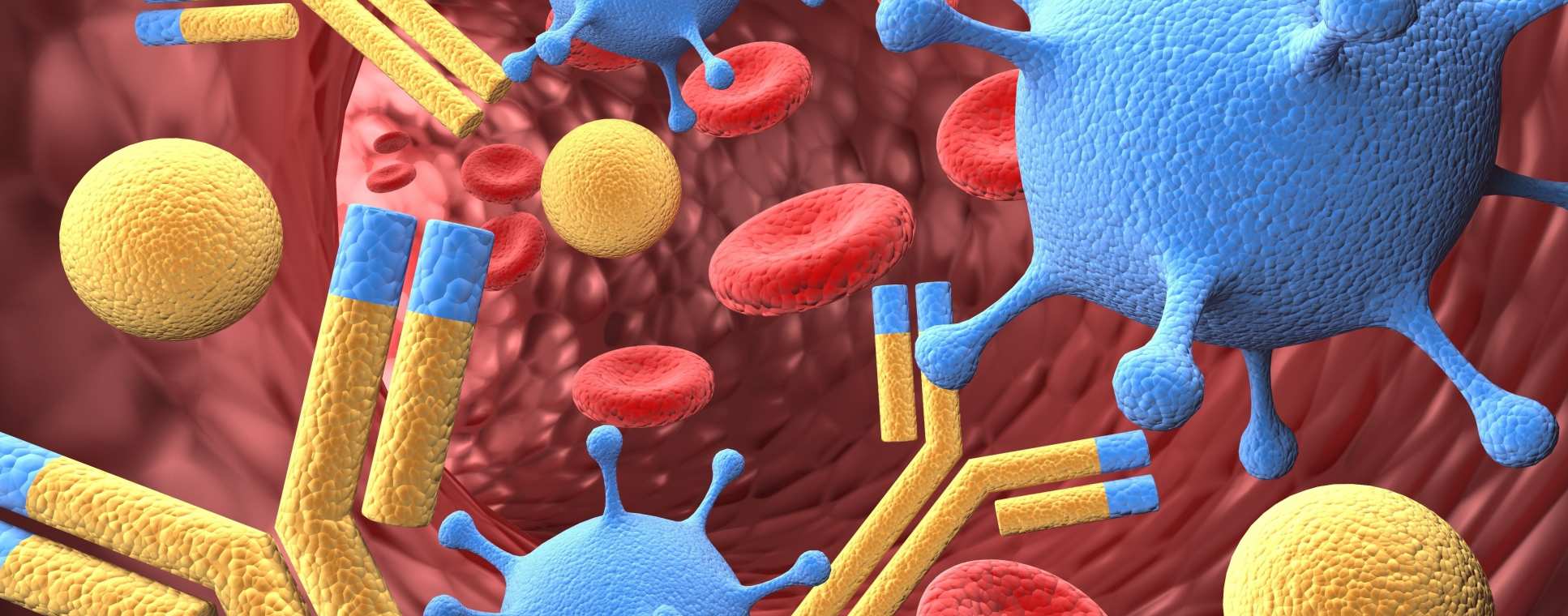
By understanding the ways in which the immune system protects from infection and responds to vaccination, new vaccines are being developed to optimally harness these pathways.
- Human beings have a complicated system of protective mechanisms that prevent infectious diseases or reduce their severity. In particular, stimulation of the immune system during most infections provide immunity that can in many cases block re-infection. Successful vaccines have harnessed these mechanisms to confer protection without the disease associated with natural infection.
- Many major infectious diseases have been controlled or eradicated by widespread vaccination but a number of globally important infections remain where effective vaccines remain difficult to produce. Many of these pathogens have evolved ways of evading immunity. It is therefore essential to understand what aspects of the immune system are best at preventing infection from a particular pathogen and how to overcome microbial immune evasion by directing the immune response differently.
- The ways in which understanding of infectious disease immunology may improve vaccines includes enhancing immunity at sites of pathogen entry such as the skin, nose and lung or gut; targeting immune responses to parts of the microbe that are relatively hidden, or increasing the size of the immune response using immune stimulators or new delivery methods.
- Vaccines may also be effective in stimulating the immune system to target cancers or altering aberrant inflammatory responses. New ways of thinking about the application of vaccine technology will promote their use in non-traditional ways.
Key members of this theme
Professor Daniel Altmann
/prod01/channel_3/media/migration/research-groups/Altmann,-Danny--tojpeg_1510049832522_x4.jpg)
Professor Daniel Altmann
Professor of Immunology
Professor Charles Bangham
/prod01/channel_3/media/migration/research-groups/Bangham,-Charles--tojpeg_1510049889389_x4.jpg)
Professor Charles Bangham
Chair of Immunology
Dr Andrew Blagborough
/prod01/channel_3/media/migration/research-groups/Blagborough,-Andrew--tojpeg_1510053346928_x4.jpg)
Dr Andrew Blagborough
Research Fellow
Professor Rosemary Boyton
/prod01/channel_3/media/migration/research-groups/Boyton,-Rosemary--tojpeg_1510049961486_x4.jpg)
Professor Rosemary Boyton
Professor of Immunology and Respiratory Medicine
Dr Christopher Chiu
/prod01/channel_3/media/migration/research-groups/Chiu,-Christopher--tojpeg_1510045235715_x4.jpg)
Dr Christopher Chiu
Clinical Senior Lecturer
Dr Fiona Culley
/prod01/channel_3/media/migration/research-groups/Culley,-Fiona--tojpeg_1510050041511_x4.jpg)
Dr Fiona Culley
Senior Lecturer
Dr Aubrey Cunnington
/prod01/channel_3/media/migration/research-groups/Cunnington,-Aubrey--tojpeg_1509960005575_x4.jpg)
Dr Aubrey Cunnington
Reader
Professor Stephen Durham
/prod01/channel_3/media/migration/research-groups/Durham,-Stephen--tojpeg_1510045323512_x4.jpg)
Professor Stephen Durham
Professor of Allergy and Respiratory Medicine
Dr Carolina Herrera
/prod01/channel_3/media/migration/research-groups/Carolina-Herrera--tojpeg_1571390857124_x4.jpg)
Dr Carolina Herrera
Senior Research Fellow
Dr Beth Holder
/prod01/channel_3/media/migration/research-groups/Holder,-Beth--tojpeg_1509963486490_x4.jpg)
Dr Beth Holder
Lecturer in Maternal and Fetal Health
Dr Cecilia Johansson
/prod01/channel_3/media/migration/research-groups/Johansson,-Cecilia--tojpeg_1510050111963_x4.jpg)
Dr Cecilia Johansson
Senior Lecturer in Respiratory Infection
Professor Mark Johnson
/prod01/channel_3/media/migration/research-groups/Johnson,-Mark--tojpeg_1510050180494_x4.jpg)
Professor Mark Johnson
Clinical Chair in Obstetrics
Professor Sebastian Johnston
/prod01/channel_3/media/migration/research-groups/Johnston,-Sebastian--tojpeg_1510045666112_x4.jpg)
Professor Sebastian Johnston
Asthma UK Clinical Chair
Professor Beate Kampmann
/prod01/channel_3/media/migration/research-groups/Kampmann,-Beate--tojpeg_1510045765512_x4.jpg)
Professor Beate Kampmann
Professor of Paediatric Infection and Immunity
Dr Kirsty Le Doare
/prod01/channel_3/media/migration/research-groups/Le-Doare,-Kirsty--tojpeg_1509959853844_x4.jpg)
Dr Kirsty Le Doare
Clinical Senior Lecturer in Paediatric Diseases
Professor Michael Levin
/prod01/channel_3/media/migration/research-groups/Levin,-Mike--tojpeg_1510049677950_x4.jpg)
Professor Michael Levin
Chair in Paediatrics and International Child Health
Dr Paul McKay
/prod01/channel_3/media/migration/research-groups/McKay,-Paul--tojpeg_1510045860646_x4.jpg)
Dr Paul McKay
Senior Research Fellow
Dr Simon Nadel
/prod01/channel_3/media/migration/research-groups/Nadel,-Simon--tojpeg_1510045983490_x4.jpg)
Dr Simon Nadel
Consultant in paediatric intensive care
Dr Sandra Newton
/prod01/channel_3/media/migration/research-groups/Newton,-Sandra--tojpeg_1509960210746_x4.jpg)
Dr Sandra Newton
Senior Research Fellow
Professor Peter Openshaw
/prod01/channel_3/media/migration/research-groups/Openshaw,-Peter--tojpeg_1510053266469_x4.jpg)
Professor Peter Openshaw
Clinical Consul for the Faculty of Medicine
Dr Katrina Pollock
/prod01/channel_3/media/migration/research-groups/Pollock,-Katrina--tojpeg_1510046751180_x4.jpg)
Dr Katrina Pollock
Clinical Lecturer
Dr Brian Robertson
/prod01/channel_3/media/migration/research-groups/Robertson,-Brian--tojpeg_1509959727707_x4.jpg)
Dr Brian Robertson
Reader in Systems Microbiology
Professor Robin Shattock
/prod01/channel_3/media/migration/research-groups/Shattock,-Robin--tojpeg_1509963401104_x4.jpg)
Professor Robin Shattock
Chair in Mucosal Infection and Immunity
Dr Mike Skinner
/prod01/channel_3/media/migration/research-groups/Skinner,-Mike--tojpeg_1509959648443_x4.jpg)
Dr Mike Skinner
Reader in Virology
Professor Shiranee Sriskandan
/prod01/channel_3/media/migration/research-groups/Sriskandan,-Shiranee--tojpeg_1509961306463_x4.jpg)
Professor Shiranee Sriskandan
Professor of Infectious Diseases
Dr Reiko Tanaka
/prod01/channel_3/media/migration/research-groups/Tanaka,-Reiko--tojpeg_1510049767904_x4.jpg)
Dr Reiko Tanaka
Senior Lecturer
Dr John Tregoning
/prod01/channel_3/media/migration/research-groups/Tregoning,-John--tojpeg_1510050434701_x4.jpg)
Dr John Tregoning
Senior Lecturer
Dr Elizabeth Whittaker
/prod01/channel_3/media/migration/research-groups/Whittaker,-Elizabeth--tojpeg_1510050525323_x4.jpg)
Dr Elizabeth Whittaker
Senior Clinical Research Fellow
Professor Robert Wilkinson
/prod01/channel_3/media/migration/research-groups/Wilkinson,-Robert--tojpeg_1510046938799_x4.jpg)
Professor Robert Wilkinson
Professor in Infectious Diseases
Professor Xiao-Ning Xu
/prod01/channel_3/media/migration/research-groups/Xu,-Xiao-Ning--tojpeg_1510045170116_x4.jpg)
Professor Xiao-Ning Xu
Chair in Human Immunology
General enquiries
Clinical Senior Lecturer
Dr Christopher Chiu
vaccine.network@imperial.ac.uk
+44 (0)20 8383 2301
